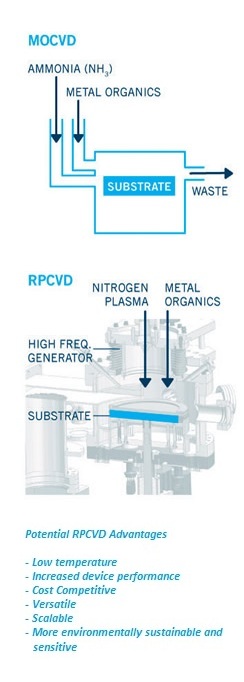The Sydney based innovator of LED and solar cell growth using Remote Plasma Chemical Vapour Deposition can now grow in the U.S., Europe, Japan, Korea and China.
Australian clean-tech innovator BluGlass has announced that its patent US2008272463, "Method and apparatus for growing a group (III) metal nitride film" has now been allowed in the U.S.
This patent, once granted in the coming weeks, brings the company's international patent portfolio up to 16 granted patents in key semiconductor markets including the U.S., Europe, Japan, Korea and China.
These patents help to provide the company with broad protection of its Remote Plasma Chemical Vapour Deposition (RPCVD) technology and underpin the commercial opportunities for BluGlass in the production of high efficiency semiconductor devices such as LEDs and solar cells.
BluGlass says its RPCVD technology has many advantages over conventional manufacturing technologies such as MOCVD. It is a lower temperature process which leads to potential performance and cost advantages in the production of LEDs and solar cells.

Following further technical advancements made by the company, BluGlass has recently lodged two additional patents through its joint venture EpiBlu.
BluGlass CEO, Giles Bourne says, "We are pleased that we had another core patent accepted in the U.S. which will further help us to protect BluGlass technology assets, enabling the company to continue to move towards commercialising the RPCVD technology."
Building upon and continuing to expand a broad based international patent portfolio is fundamental to the commercialisation of the BluGlass technology. In addition to the 16 granted patents, BluGlass now has 17 provisional patents in four patent families filed in key semiconductor manufacturing countries.
Apart from its JV, EpiBlu, the company also has a subsidiary, BluSolar, which is now exploring the process viability of RCPVD in photovoltaic (solar) applications.





